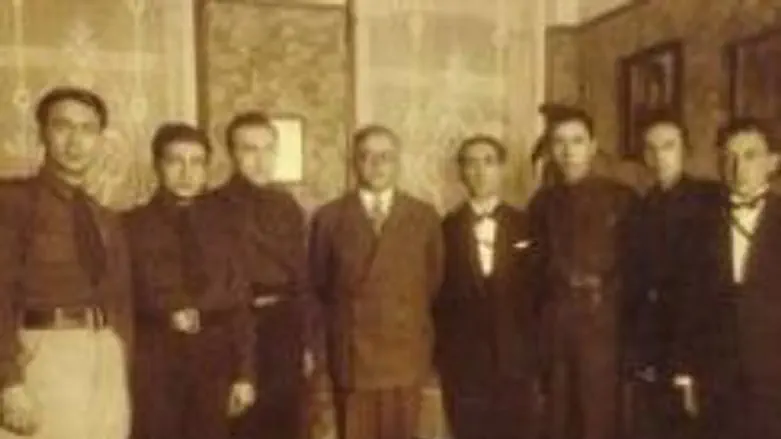
Even now, 70 years after his death, heretofore unknown photos of Zionist leader Ze’ev Jabotinsky continue to surface.
The Jabotinsky Institute in Tel Aviv received in recent days an album of photos of the leader of Betar and his hosts in Vilna (Vilnius) during a visit to what was then Poland in the 1920s.
The album was donated by Chana Kadmon of Tel Aviv, whose father, Betzalel Avneri-Lichtenstein, was one of the founders of the “Shachar” Zionist youth movement in Vilna, which later became the famous Betar Movement. His album contains dozens of photos featuring Betar activities in Vilna between 1926 and 1931.

Avneri-Lichtenstein wrote in his memoirs that the Shachar-Betar movement numbered some 1,200 young members at the time. He recounted how a Betar honor guard of bicycle riders welcomed Jabotinsky when he visited, and accompanied him from the train station to his hotel room.
Other photos show Betar members greeting then-Polish President Moshtitzky in the city’s Great Synagogue.
Another donation that was recently received in the Jabotinsky Institute is a cardboard box – one that was thrown out of a British transport vehicle taking Betar prisoners from Latrun to the Atlit concentration camp. The incident occurred in late 1947, when the bus passed near Haifa, and on one side of the box is a message written in large letters stating, “The third convoy of Latrun detainees is being taken to Atlit. Regards to the fighting yishuv [referring to the Jewish population of pre-State Israel].”
Mr. Yosef Kovo, who served as a Betar officer at the time and who donated the box, explained, “It is my hope that this concrete testimony of the British mandate period will enrich the museum’s collection.”
Ze'ev Jabotinsky (1880-1940) was a Revisionist Zionist leader, author, orator, soldier, and founder of the Jewish Self-Defense Organization in Odessa. He also helped form the Jewish Legion of the British army in World War I and was later recognized as a political authority by the high command of the militant Zionist underground organization, Irgun Zvai Leumi (Etzel).
New Home in Ramat Gan
The Jabotinsky Institute is planning to erect and move into its new home, called The Jabotinsky International Center in Ramat Gan. The complex will include the institute’s renowned archives and museum, as well as an ample library, study rooms, auditorium, expanded museum halls, Prime Minister Yitzchak Shamir’s personal archives, and more. Initial museum exhibits will feature the life and work of Jabotinsky, campaigns of the Etzel, and Betar’s armed resistance in the Warsaw Ghetto Uprising and the Holocaust. The complex will also house the new International Headquarters for Combating Anti-Semitism, as well as Betar’s newly established Department of Communication and National Hasbara (Advocacy).